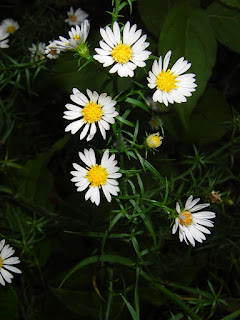| Common Name | Scientific Name | Size | Qty | SALE PRICE | Notes |
| butterfly milkweed | Asclepias tuberosa | 2.5” plug | 2 | $3.00 | |
| Bicknell's sedge | Carex bicknellii | quart | 6 | $2.00 | leggy divided plants |
| ivory sedge | Carex emeryi | 2.5” plug | 13 | $3.00 | nice looking, for sedge lawn |
| turtlehead | Chelone glabra | 2.5” plug | 6 | $2.00 | |
| Virgin's bower | Clematis virginiana | quart | 5 | $3.00 | |
| pagoda dogwood | Cornus alternifolia | 1-gallon | 1 | $9.00 | ~18” tall |
| pagoda dogwood | Cornus alternifolia | 2-gallon | 1 | $14.00 | ~2.5” tall |
| pale purple coneflower | Echinacea pallida | 2.5” plug | 7 | $1.00 | small |
| pale purple coneflower | Echinacea pallida | 2.5” plug | 8 | $2.50 | |
| bottlebrush grass | Elymus hystrix | 2.5” plug | 12 | $2.00 | |
| bottlebrush grass | Elymus hystrix | quart | 5 | $3.00 | |
| Virginia wild-rye | Elymus virginicus | quart | 1 | $2.50 | |
| white trout lily | Erythronium albidum | 2.5” plug | 28 | $4.00 | dormant |
| purple joe pye weed | Eupatorium purpureum | 2.5” plug | 26 | $2.00 | |
| purple joe pye weed | Eupatorium purpureum | quart | 1 | $3.00 | |
| smooth rose mallow | Hibiscus laevis | quart | 9 | $6.00 | wet spots only |
| common juniper | Juniperus communis | quart | 1 | $4.00 | Possibly virginiana? Great bonsai tree! |
| Virginia bluebells | Mertensia virginica | quart | 1 | $3.00 | |
| prickly pears | Opuntia humifusa | quart | 34 | $5.00 | |
| solomon's seal | Polygonatum biflorum | Gallon+ | 33 | $5.00 | bare root in pot |
| solomon's seal | Polygonatum biflorum | quart | 32 | $3.00 | bare root in pot |
| early wild rose | Rosa blanda | quart | 1 | $4.00 | |
| Black-eyed susan | Rudbeckia hirta | 2.5” plug | 2 | $2.00 | |
| little blue stem | Schizachyrium scoparium | 2.5” plug | 7 | $2.50 | |
| stiff goldenrod | Solidago rigida | 2.5” plug | 8 | $2.50 | |
| elm-leaved goldenrod | Solidago ulmifolia | quart | 4 | $4.00 |
Fall is the best time to plant perennials. With cooler temperatures as the growing season comes to a close the plants have great conditions to settle in this fall and plenty of time next spring to put down roots before the stressful heat of summer. So take advantage of these deals and get planting!
Availability is limited, so please email me at frank at goodoak dot com, to place an order and call "dibs" on your plants!
UPDATED: 10/14/12 @ 6:45pm.



